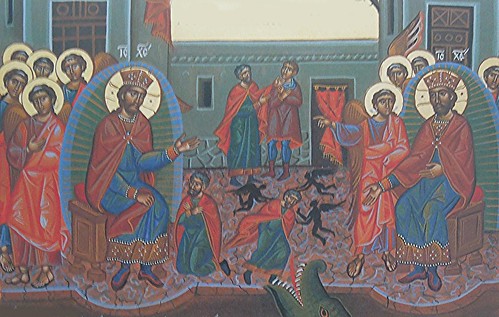On the second Sunday of Great Lent we read the Gospel lesson from Mark 2:1-12.
And again He entered Capernaum after some days, and it was heard that He was in the house. Immediately many gathered together, so that there was no longer room to receive them, not even near the door. And He preached the word to them. Then they came to Him, bringing a paralytic who was carried by four men. And when they could not come near Him because of the crowd, they uncovered the roof where He was. So when they had broken through, they let down the bed on which the paralytic was lying.
When Jesus saw their faith, He said to the paralytic, “Son, your sins are forgiven you.” And some of the scribes were sitting there and reasoning in their hearts, Why does this Man speak blasphemies like this? Who can forgive sins but God alone? But immediately, when Jesus perceived in His spirit that they reasoned thus within themselves, He said to them, “Why do you reason about these things in your hearts? Which is easier, to say to the paralytic, ‘Your sins are forgiven you,’ or to say, ‘Arise, take up your bed and walk’? But that you may know that the Son of Man has power on earth to forgive sins. He said to the paralytic, I say to you, arise, take up your bed, and go to your house. Immediately he arose, took up the bed, and went out in the presence of them all, so that all were amazed and glorified God, saying, “We never saw anything like this!”
Forgiving others their debts and offenses, and seeking forgiveness from God are two key elements of living the evangelical life in Christ. And while Christ in the Sermon on the Mount and in the Lord’s prayer specifically makes it clear our receiving forgiveness is dependent on our willingness to forgive, Fr. Boris Bobrinsky points out the forgiveness originates in God before we are asked to do anything. God forgives us while we are still sinners. We are imitating God when we forgive others. We show mercy and love to others because Christ first loved us.
“ ‘How can we ask for God’s forgiveness, if we ourselves do not forgive those who owe us?’ (Sir. 28:3). […]The entire context of the Bible compels us not to make mutual forgiveness the condition for the forgiveness of God, but, quite to the contrary, to see the necessary consequence in it. One of the fundamental parables, in which we discover that God’s forgiveness is first, sheds light on the Our Father: A man who owed ten thousand talents – a vast sum of money – to his master, threw himself at the feet of his master and asked for a delay. The master set him free and granted him a remission of his entire debt (Mt. 18:23-35).
We encounter this fundamental fact everywhere – the priority, the primacy of the forgiveness of God. St. Paul also speaks of it in the Epistle to the Romans: ‘At just the right time, when we were still powerless, Christ died for the ungodly…While we were sinners, Christ died for us. Very rarely will anyone die for a good man, but Christ demonstrated His love for us in this: while we were still sinners, Christ died for us – that is the profound meaning of forgiveness.’ (Rom. 5:6). St. Paul confirms in the Epistle to the Ephesians: ‘Be kind and compassionate to one another, forgiving each other, just as in Christ God forgave you’ (Eph. 4:32).” (Boris Bobrinsky, The Compassion of the Father, pp 74-75)
Who can forgive sins? God can. And we in imitation of God can forgive others as well. In so doing we accept the forgiveness God offers to us.



